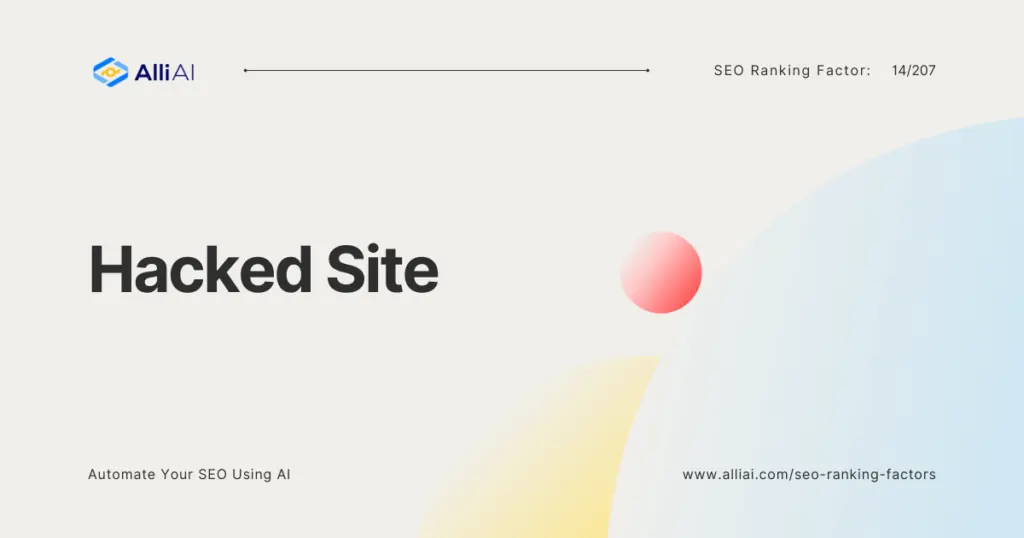What is Hacked Site as a Ranking Factor?
A “hacked site” refers to a website that has been compromised by unauthorized individuals. These cyber attackers can inject malicious code, spread malware, or even use your site to distribute spam. The term encompasses any unauthorized access that alters a site’s content or its intended functionality.
Search engines, notably Google, strive to present users with secure, relevant, and valuable content. When a site is hacked and flagged, it can be penalized or completely removed from search results to protect users from potential harm. This status significantly degrades the site’s SEO performance, as visibility on search results directly correlates with traffic volume and site authority.
Imagine going to your favorite coffee shop, only to find its name and signage changed overnight to advertise a product completely unrelated to coffee. Your trust in the coffee shop would be shaken, and you might avoid it, fearing something is wrong. This scenario is similar to what happens when a search engine detects a site has been hacked. Users and search engines lose trust in the site, leading to decreased traffic and visibility.
Why is Hacked Site Important in SEO?
A hacked site is paramount in SEO for several reasons. Firstly, it directly affects user trust and experience. Users who encounter a hacked site or get a warning from their browser or search engine are likely to leave immediately, increasing bounce rates and decreasing the likelihood of returning. Secondly, search engines penalize hacked sites by dropping their rankings or removing them from search results, reducing the site’s visibility and traffic.
A compromised site can also lead to a loss in revenue, especially if it’s an e-commerce platform. The integrity and reputation of your brand are at stake. Rebuilding user trust and recovering from the SEO impact can be a long and challenging process.
How Hacked Site Affects SEO
Being flagged as hacked by search engines can have devastating effects on a site’s SEO. Here are relevant stats and their implications:
1. Drop in Rankings: According to Google, compromised sites can see a significant drop in rankings or may not appear in search results at all. This decrease is due to the engine’s effort to protect its users from potentially harmful content.
2. Increased Bounce Rates: Users are more likely to leave a site immediately if they encounter suspicious activity, significantly increasing the site’s bounce rate. High bounce rates signal to search engines that the content may not be valuable or relevant, further affecting rankings.
3. Decreased Traffic: A study by Kaspersky revealed that sites labeled as dangerous saw a decrease in traffic by up to 95%. This drastic drop can impact not only immediate revenue but also long-term SEO efforts and brand reputation.
FAQ
How can I know if my site has been hacked?
Regular monitoring of your site through tools like Google Search Console can alert you to potential security issues. Signs include unusual spikes in traffic, unknown files or scripts on your server, and warnings from browsers or antivirus programs when accessing your site.
What should I do if my site is hacked?
Immediately contact your hosting provider and consider bringing on a cybersecurity expert. You’ll need to identify and remove the malicious content, restore from a clean backup if available, and address any vulnerabilities to prevent future attacks. Inform your users about the breach and the steps you’re taking to resolve the issue.
How long does it take to recover from a hacked site in SEO terms?
Recovery time can vary significantly, from a few weeks to several months, depending on the severity of the hack and how quickly and effectively you respond. After cleaning your site and ensuring its security, request a review from the search engine to remove any penalties or warnings affecting your site’s visibility.
Conclusion
The security of your website cannot be taken lightly, not just for the sake of user protection but for its critical impact on SEO. A hacked site can lead to a nosedive in rankings, traffic, and ultimately, revenue and reputation. Vigilance, quick action, and a solid security plan are your best defenses against being compromised. Regularly updating your site, using secure passwords, and employing reputable security plugins or services can help safeguard your site from such pitfalls. In the digital age, a secure site is a successful site.






